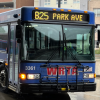Multiple Massachusetts communities observed Juneteenth over the long weekend. In the second year that the day commemorating the emancipation of enslaved people has been observed as a federal holiday, cities including Boston marked the occasion with public celebrations.
On Sunday, a parade starting in Boston’s Nubian Square wound through the streets of Roxbury and came to a stop outside the National Center of Afro-American Artists. Black leaders including US Attorney Rachael Rollins noted the holiday’s joy while also drawing attention to ongoing injustices and the threat of white supremacy.
“Are we going to see the same reaction by our federal, state, and local government on these violent racist extremists that we’ve seen in Black and Brown and poor communities with respect to gang violence?” said Rollins, the state's top federal prosecutor. “I would hope so.”
On Monday, the day of the federal holiday, smaller communities held their own celebrations. In Melrose, dozens of residents gathered in front of the city’s public library as speakers including poet Michelle Richardson urged the crowd to reject intolerance.
“We have to change the dynamic,” said Richardson. “Hatred is a taught and learned thing. Go back to the time in your life when you were babies, before someone told you who to love.”
The city of Waltham also held a Juneteenth celebration on Monday. A diverse crowd of more than 100 people came to the city’s common, where community organizations had set up information booths, a DJ played songs by Black artists, and children enjoyed a bounce house.
Waltham resident Sally Jean Baptiste came to the celebration with her four year old nephew, where they played lawn games laid out by organizers. A Black woman of Haitian origin, Baptiste said she hopes her nephew comes away from the event with a deeper sense of community.
“When he goes out into the world, he can always come back and realize that there are always other Black people, people of color around the area that will recognize him and welcome him,” Baptiste said. “Hopefully [there will be] less injustice in the future for him.”









